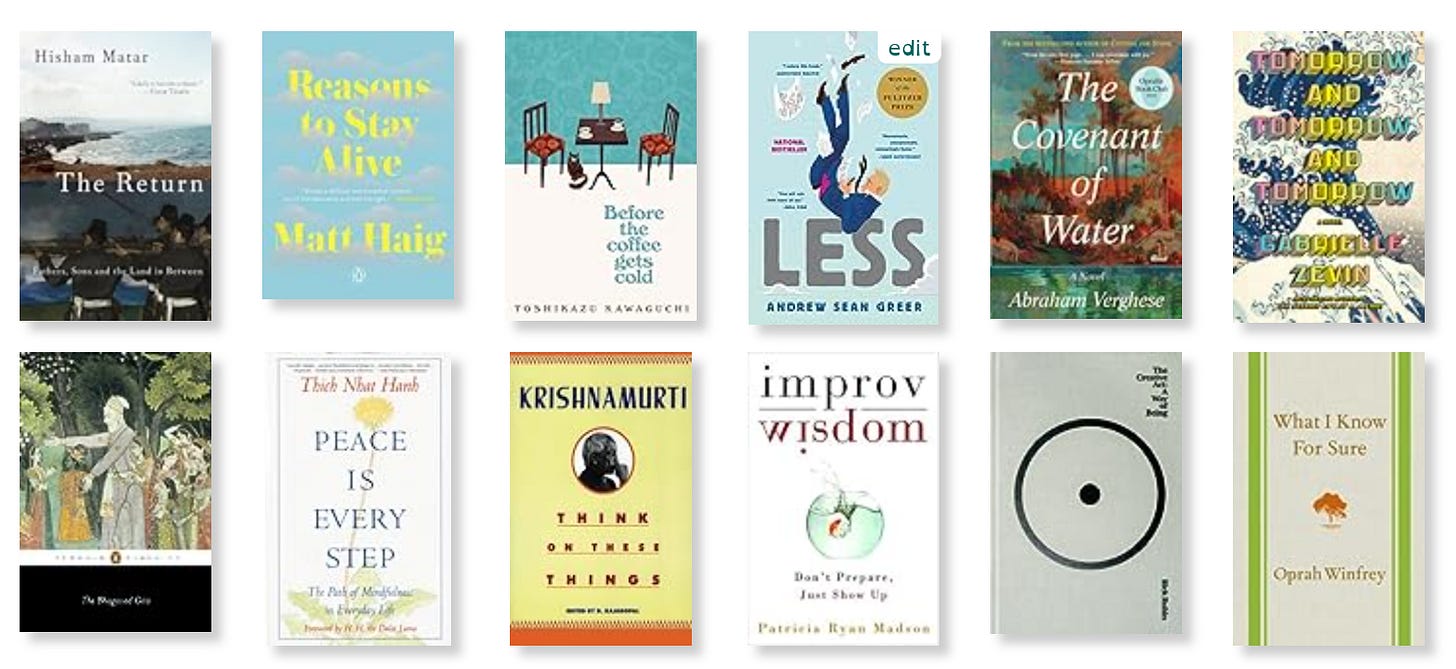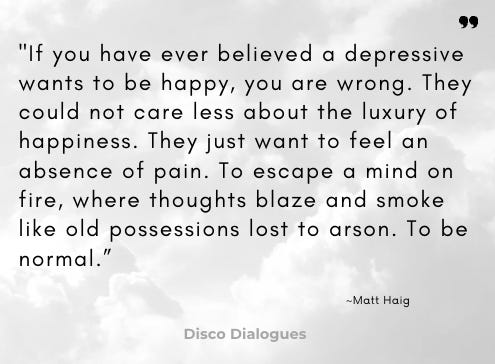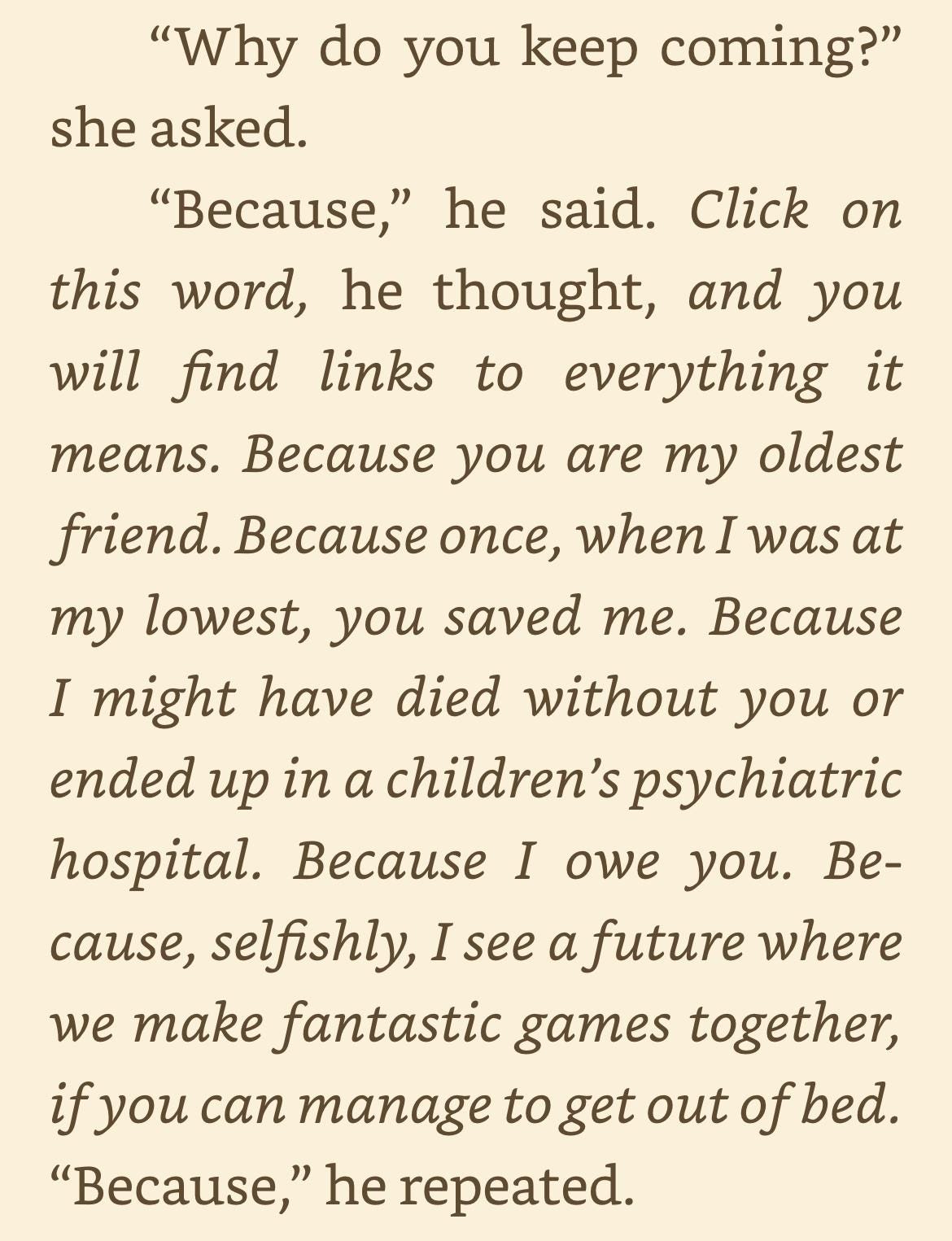Disco Dialogues is a newsletter and interview series where Kinnari and Mitali engage in deliberate dialogue aimed to spark inner growth. Our posts start with a question to encourage reflection on topics ranging from creativity, courage and curiosity to self-care and relationships. The hope is that by sharing the dialogues that we have with ourselves and with each other, we can start meaningful conversations within our community.
This week we curated a list of our favorite recent reads across four categories - biographies, fiction, spiritual, and thought-provoking. Whether you are traveling this summer or enjoying time at home, we hope these books transport you to distant lands metaphorically or nudge you to go deeper within.
Biographies and Memoirs
I [Mitali] read this novel and memoir earlier this year as I was emerging from a depression episode. The way Matt describes his experiences of living with depression and anxiety disorder from the age of 24 really resonated with me. The English author of popular books - The Midnight Library and How to Stop Time - writes fiction and nonfiction books and this was his first nonfiction piece and the first time he wrote about his illness publicly.
Winner of the 2017 Pulitzer Prize, this memoir centers on Matar's return to his native Libya in 2012 to search for the truth behind the 1990 disappearance of his father, a prominent political dissident of the Gaddafi regime. It explores themes of family, loss, the search for identity in a country torn by political turmoil and the dreams of return faced by so many exiles and those who flee war.
“We imagine our lives to be but stone thrown into water, what ripples they make soon vanish, so we say. But this is not true. Like rocks into water, our lives create waves.”
Fiction
This is a perfect read for anyone who loves quirky stories, emotional journeys, and a touch of the fantastical. It has a unique format - each chapter focuses on a different character and their time travel experience, creating a mosaic of interconnected stories.
“At the end of the day, whether one returns to the past or travels to the future, the present does not change. So it raises the question: just what is the point of that chair?
…The present hadn’t changed—but those two people had. Both Kohtake and Hirai returned to the present with a changed heart.”
This is a satirical comedy novel about a man, Arthur Less, living in San Francisco. He’s about to turn 50 and his long-time lover is about to get married to someone else. So Arthur decides to travel across the world to try and forget about the man that he loves. The prose is wonderful, playful, and the character is vain, anxious, insecure and loveable. There are some beautiful, witty, observant lines in there about relationships, getting older, and happiness.
This book pulled me [Mitali] in immediately with its portrayal of the friendship between three friends who started a video game company during college and the course of their relationships over 30 years. The female protagonist is an MIT engineer and it brought back memories of my special time in Cambridge as an undergrad. It also made me regret not playing video games in college but am glad I at least did Shakespeare theater. 😀 Also the description of how friends show up for each other when one is struggling through depression really spoke to me.
I [Kinnari] read this beast of a novel a few weeks before my second daughter arrived in July 2023. I had just started my maternity leave and was stepping away from the corporate world and turning my focus towards running the home and family. I had the luxury of time on my hands.
“What I am saying is please treasure each day you are in your marriage. To be a wife, to care for a husband, to have children, is there anything more valuable?”
I found the prose to be poetic, fell in love with the characters and silent tears ran down my face as I turned the pages on many nights. Set on South India’s Malabar Coast, this book follows three generations of a family that suffers a peculiar affliction. The book is gripping right from the very start - a twelve year old girl grieving the death of her father - is sent by boat to her wedding, where she meets her forty year old husband for the very first time.
Oprah put it on her book club and has said that it’s one of the best books she’s read in her entire life. "It's epic. It's transportive. Many moments during the read I had to stop and remember to breathe. I couldn't put the book down until the very last page. It was unputdownable!"
Read this book if you are a mother. Read it if you are not. Read it if you are from India, or read it if you are not so you can reconnect with or learn about the magic of that land. Read it if you love stories. Read it as a reminder to savor the simplicity, the hardships and richness of life, of family and of love.
Spiritual books that inspire us to be present
Most of you might have already heard of the Bhagvad Gita - one of the most sacred books in Hinduism which is a conversation between Lord Krishna and Prince Arjuna on the battlefield. Although I [Kinnari] have known of it since I was a child, I read it for the first time this year. A few weeks after my reading, I found myself in a conversation with a Hindu priest in San Francisco and in an unconscious attempt to impress him I said “I just finished reading the Bhagvad Gita”. “We must never say we have finished reading the Bhagvad Gita. It is a book we can continue reading through our life.” Perhaps that is true of most religious/spiritual texts but it really does ring true for this one.
I was caught by surprise while reading it - so much of it seemed so familiar. It seems to be the source of so many of our spiritual teachings and ideas. If you have considered reading it at some point in your life, perhaps me putting it in here will nudge you towards it. It is wise, it is powerful. It is more spiritual, less religious. It reminds us of the divinity within each of us. It moves us towards our connection to each other, towards service, towards love.
While reading this book, I was also listening to Ram Das’ Paths to God: Living the Bhagvad Gita. Ram Das’ stories and anecdotes helped get me deeper into the Gita.
The man who sees me in everything
and everything within me
will not be lost to me, nor
will I ever be lost to him.
He who is rooted in oneness
realizes that I am
in every being; wherever
he goes, he remains in me.
When he sees all beings as equal
in suffering or in joy
because they are like himself,
that man has grown perfect in yoga.
This book by Thich Nhat Hanh, a Vietnamese Buddhist monk and peace activist, includes short essays that provide profound and practical teachings on mindfulness. The book contains commentaries on how to be present in everyday moments and anecdotes on how to transform negative emotions and foster compassion.
J. Krishnamurti was an Indian philosopher, writer and speaker. This book is based on a series of talks he gave to students, teachers and parents in India, published in 1964. He answers questions about ambition, education, fear, happiness, freedom, and the nature of the human mind. We recommend taking your time with each page, savoring the way Krishnamurti unpacks everyday experiences – the ache of ambition, the sting of comparison, the comfort of routine – and reveals their deeper meanings. He doesn't offer pat answers or rigid doctrines. He invites us to observe, to question, to discover our own truth.
“...So when the pain of loneliness comes upon you, confront it, look at it without any thought of running away…But those who are inwardly alone, whose minds and hearts are free from the ache of loneliness - they are real people, for they can discover for themselves what reality is, they can receive that which is timeless.”
Thought provoking, life changing books
“The practice of improvisation (in contrast, say, to that of writing or painting) teaches something that we are hungry to understand: how to be in harmony with one another and how to have fun. We practice improvisation not only to “express ourselves” but to connect with others in a more immediate way.”
Improv Wisdom shows how to apply the maxims of improvisational theater to real-life challenges—whether it’s dealing with a demanding boss, a tired child, or one of life’s never-ending surprises. Patricia Madson, a Stanford professor distills thirty years of experience into thirteen simple strategies helping readers to loosen up, think on their feet, and take on everything life has to offer with skill, chutzpah, and a sense of humor.
One practice described in the book that really stood out for me [Kinnari] is the Japanese method of self-reflection and meditation called Naikan. The word “naikan” means looking inside or seeing oneself with the mind’s eye and encourages the student to step back and reflect on the life they are living. The practice involves asking oneself three questions:
-What have I received from others during my life?
-What have I given back to them?
-What trouble or bother have I caused them?
The questions are used to examine important relationships and are directed at key individuals in one’s life.
“I set out to write a book about what to do to make a great work of art. Instead, it revealed itself to be a book on how to be.”
This is the first book by Rick Rubin, a legendary music producer (co-founder of the record label Def Jam Recordings, and former co-president of Columbia Records), who is known for creating a space where artists of all different genres and traditions can home in on who they really are and what they really offer. He talks about how creativity has a place in everyone's life and it is everyone's responsibility to make a place for it. In this book he shares wisdom from a lifetime of work with artists - helping them transcend their self imposed expectations to reconnect with a state of innocence.
“Awareness is not a state you force. There is little effort involved, though persistence is key. It’s something you actively allow to happen. It is a presence with, and acceptance of, what is happening in the eternal now.”
Thanks to family members for recommending this book to me [Mitali] recently. I enjoyed listening to the audiobook as it is narrated by Oprah. It came at the right moment and was a reminder of all the values I know to be important in helping me lead a fulfilled life.
The description of the book says it all - “Candid, moving, exhilarating, uplifting, and frequently humorous, the words Oprah shares in What I Know For Sure shimmer with the sort of truth that readers will turn to again and again. Organized by theme – joy, resilience, connection, gratitude, possibility, awe, clarity, and power – these essays offer a rare, powerful and intimate glimpse into the heart and mind of one of the world's most extraordinary women, while providing readers a guide to becoming their best selves.”
“There is one irrefutable law of the universe: We are each responsible for our own life. If you’re holding anyone else accountable for your happiness, you’re wasting your time. You must be fearless enough to give yourself the love you didn’t receive.”









